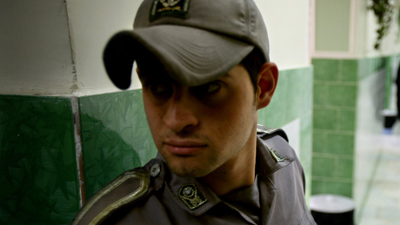New York, February, 22, 2013–Yet another journalist has been arrested in Iran as part of the broad crackdown aimed at silencing dissent before Iran’s presidential elections in June, according to news reports. The Committee to Protect Journalists calls on authorities to halt their pattern of imprisoning journalists and instead allow members of the press to report freely without fear of reprisal.
Police arrested Ehsan Mazandarani, a reporter for the reformist daily Etemad, on Wednesday after authorities said at the Etemad offices on January 27 that they were looking for him. News accounts did not immediately report Mazandarani’s location at the time of his arrest.
“The arrest of Ehsan Mazandarani is part of a disturbing pattern of detention designed to stifle independent reporting ahead of the elections,” said Sherif Mansour, CPJ’s Middle East and North Africa coordinator. “Iranian authorities should release him and all other journalists immediately and end this crackdown against the press.”
The newest crackdown on critical journalists in Iran began on January 27, what is now called “Black Sunday” when authorities detained at least 14 journalists affiliated with reformist news outlets. The crackdown continued with the arrest of three more journalists in the past three weeks. Mazandarani’s detention brings to at least 18 the number of journalists arrested since the beginning of the crackdown.
The Iranian Intelligence Ministry released a statement on Tuesday, its third since the beginning of the crackdown, that claimed the journalists were part of a nefarious spy ring affiliated with the BBC. The Iranian government has frequently made such baseless accusations as an excuse for repressing local dissidents. The International Campaign for Human Rights in Iran reported that the families of the detained journalists have said they believe some of the reporters could have been forced to give false confessions.
News accounts have reported the release of at least three Iranian journalists from Evin Prison in the past week: Fatemeh Sagharchi, editor for the reformist news website Jamaran, was released on February 17 on bail of 1.2 billion rials; Javad Deliri, editor-in-chief of Etemad, was released on bail on February 18; and Hossein Yaghchi, a member of Aseman Weekly‘s editorial board, was released on bail on Wednesday. Earlier this month, CPJ documented the release from prison of Arman reporter Motahareh Shafiee and Bahar business editor Ali Dehghan.
With these new arrests and releases, at least 13 journalists from the January 27 crackdown remain in custody.
Through this crackdown on the press, the Iranian government has sought to scare opposition voices in the lead-up to presidential elections this June. Despite this threat, 50 Iranian journalists penned an open letter to CPJ and other press freedom organizations, saying: “We are journalists and it is our duty to support truth. If being a journalist is a crime, we are all accomplices to that crime.”
Iran has maintained a revolving-door policy for imprisoning journalists, freeing some detainees on furloughs even as new arrests are made. In its December 2012 prison census, CPJ found that Iran was the world’s second-worst jailer of journalists, with 45 journalists imprisoned in reprisal for their work. The threat of imprisonment has led scores of Iranian journalists to flee into exile in recent years.
- For more information and analysis, please visit CPJ’s Iran page here.
